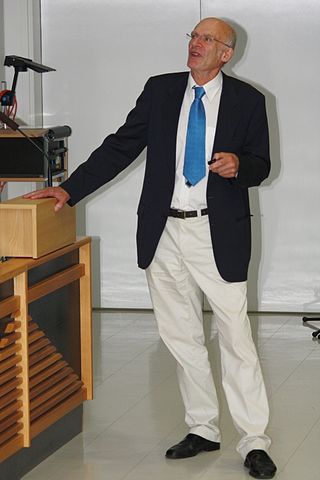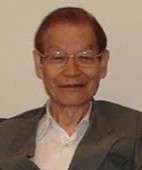Choh Hao Li was a Chinese-born American biochemist who discovered in 1966 that human pituitary growth hormone (somatotropin) consists of a chain of 256 amino acids. In 1970, he succeeded in synthesizing this hormone, the largest protein molecule synthesized up to that time.

Shantungosaurus is a genus of very large saurolophine hadrosaurid dinosaur found in the Late Cretaceous Wangshi Group of the Shandong Peninsula in China, containing a single species, Shantungosaurus giganteus. The stratigraphic interval of Shantungosaurus ranges from the top of the Xingezhuang Formation to the middle of the Hongtuya Formation, middle to late Campanian in age. Shantungosaurus is so far the largest hadrosauroid taxon in the world, with size estimates around 15–17 metres (49–56 ft) in length and 13–16 metric tons in body mass.
The Xiagou Formation is the middle strata of the Xinminbao Group. It is named for its type site in Xiagou, in the Changma Basin of Gansu Province, northwestern China and is considered Early Cretaceous in age. It is known outside the specialized world of Chinese geology as the site of a Lagerstätte in which the fossils were preserved of Gansus yumenensis, the earliest true modern bird.

Risto Kalervo Näätänen was a Finnish psychological scientist, pioneer in the field of cognitive neuroscience, and known worldwide as one of the discoverers of the electrophysiological mismatch negativity. He was a much-cited social scientist and one of the few individuals appointed permanent Academy Professor of the Academy of Finland. He retired in 2007 and retained a title of Academy Professor emeritus of the Academy of Finland. He was a professor at the University of Tartu starting in 2007.
Paleontology or palaeontology is the study of prehistoric life forms on Earth through the examination of plant and animal fossils. This includes the study of body fossils, tracks (ichnites), burrows, cast-off parts, fossilised feces (coprolites), palynomorphs and chemical residues. Because humans have encountered fossils for millennia, paleontology has a long history both before and after becoming formalized as a science. This article records significant discoveries and events related to paleontology that occurred or were published in the year 2007.

Acta Biochimica et Biophysica Sinica (ABBS) is a peer-reviewed scientific journal which publishes original research articles, short communications, and reviews in the fields of biochemistry and biophysics. Established in 1958, the journal is sponsored by the Institute of Biochemistry and Cell Biology, an institute of the Chinese Academy of Sciences, and is published monthly by Oxford Journals and was published by Blackwell Publishing prior to January 2009.
Ping Li is currently Sin Wai Kin Professor in Humanities and Technology, Chair Professor of Neurolinguistics and Bilingual Studies, and Dean of the Faculty of Humanities at the Hong Kong Polytechnic University (PolyU). Prior to joining PolyU, he was a Professor of Psychology, Linguistics, and Information Sciences and Technology, and Associate Director of the Institute for Computational and Data Sciences at Pennsylvania State University. His research interests are in language acquisition, bilingualism, and reading comprehension in both children and adults. He uses digital technologies and cognitive neuroscience methods to study neuroplasticity and individual differences in learning, so as to understand the relationships among languages, cultures, technology, and the brain. Li received a B.A. in Chinese linguistics from Peking University in 1983, an M.A. in theoretical linguistics from Peking University, a Ph.D. in psycholinguistics from Leiden University and the Max Planck Institute for Psycholinguistics in 1990, and completed post-doctoral fellowships at the Center for Research in Language at the University of California, San Diego and the McDonnell-Pew Center for Research in Cognitive Neuroscience in 1992. Li has been employed at the Chinese University of Hong Kong (1992–1996), the University of Richmond (1996–2006), and Pennsylvania State University (2008–2019), and he has also served as Program Director for the Perception, Action, and Cognition Program and the Cognitive Neuroscience Program at the National Science Foundation (2007–2009). Li was also President of the Society for Computation in Psychology and is currently Editor of Brain and Language, Elsevier and Senior Editor of Cognitive Science, Wiley. He is an elected Fellow of the American Association for the Advancement of Science (AAAS).
Judith F. Kroll is a Distinguished Professor of Language Science at University of California, Irvine. She specializes in psycholinguistics, focusing on second language acquisition and bilingual language processing. With Randi Martin and Suparna Rajaram, Kroll co-founded the organization Women in Cognitive Science in 2001. She is a Fellow of the American Association for the Advancement of Science (AAAS), the American Psychological Association (APA), the Psychonomic Society, the Society of Experimental Psychologists, and the Association for Psychological Science (APS).

The Tiaojishan Formation is a geological formation in Hebei and Liaoning, People's Republic of China, dating to the middle-late Jurassic period. It is known for its exceptionally preserved fossils, including those of plants, insects and vertebrates. It is made up mainly of pyroclastic rock interspersed with basic volcanic and sedimentary rocks. Previously, the Tiaojishan Formation was grouped together with the underlying Haifanggou Formation as a single "Lanqi Formation." The Tiaojishan Formation forms a key part of the Yanliao Biota assemblage, alongside the Haifanggou Formation.
The Haifanggou Formation, also known as the Jiulongshan Formation, is a fossil-bearing rock deposit located near Daohugou village of Ningcheng County, in Inner Mongolia, northeastern China.

Feng Depei or Te-Pei Feng was a Chinese neuroscientist and physiologist. He is considered one of founders of modern Chinese neuroscience and physiology.

Chinese Physics B is a monthly peer-reviewed scientific journal published in English by IOP Publishing. It is sponsored by the Chinese Physical Society and the Institute of Physics, Chinese Academy of Sciences.
Acta Psychologica is a peer-reviewed open access academic journal. Effective 1 January 2021, it became fully open access. It publishes articles in six different sections: cognition, social psychology, clinical and health psychology, language psychology, individual differences, and lifespan development. The journal was established in 1935 and is published ten times per year by Elsevier. According to the Journal Citation Reports, it has a 2020 impact factor of 1.734.
The Chinese Psychological Society is a non-profit academic organization, established by a group of psychologists in China. It was founded in 1921 and it is one of the earliest established national organizations in China, aiming at uniting all the psychologists to work and promote in the field of psychology.

Allognosta is a genus of soldier flies in the family Stratiomyidae.

Wang Yinglai, also known as Ying-Lai Wang, was a Chinese biochemist recognized as the first person to create synthetic insulin, a major scientific breakthrough that produced a biologically active compound from inorganic chemicals. He was one of the first group of scientists elected to the Chinese Academy of Sciences in 1955. He founded the Shanghai Institute of Biochemistry in 1958 and served as its director until his retirement in 1984.

Yang Kuo-shu was a Chinese psychologist and political activist in Taiwan, considered the founder of indigenized Chinese psychology. He served as professor and Chair of the Psychology Department of National Taiwan University. He became Vice-President of Academic Sinica in 1996, and was elected as an academician in 1998. He was an advocate for political freedom and democracy during the Martial Law era, and was the founding president of the Taipei Society.

Acta Sedimentologica Sinica is a peer-reviewed scientific journal covering the fields of sedimentology, sedimentary mineral deposits, and geochemistry. It is sponsored by the Professional Committee of Sedimentology of the Chinese Society of Mineral and Rock Geochemistry and the Professional Committee of Sedimentary Geology of the Chinese Geological Society.









